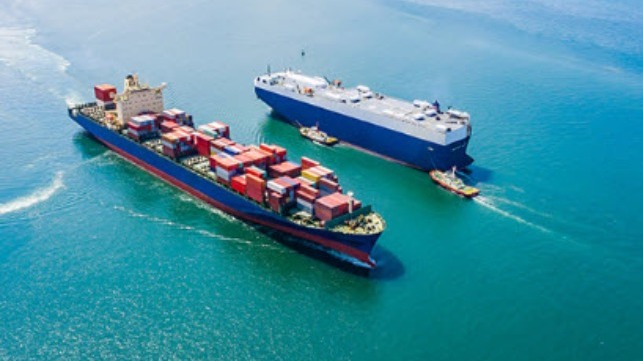
SEA-LNG, the Industry coalition established to promote the advancement of LNG, issued an analysis of the new ship construction orders as an opportunity to focus on the growth in LNG-fueled vessels. The group is highlighting 2021 as a banner year for new LNG dual-fuel vessel orders saying that the deep-sea sectors of the maritime industry are increasingly ordering dual-fuel newbuilds as a near-term solution and to protect their investments.
“The deep-sea shipping industry understands that while LNG may not be the end game, it is the best starting point to get to net zero. It provides a very clear and achievable plan which starts today,” said Peter Keller, Chairman of SEA-LNG. “We know the need is real and waiting is no longer an option. The acceleration in uptake of newbuilds fueled by LNG demonstrates confidence in this pathway through its bio and synthetic cousins.”
SEA-LNG analyzed the latest report from Clarkson Research Services detailing new constructions orders in 2021. They calculated that “LNG-fueled vessel orders are approaching 30 percent of gross tonnage on order, representing a substantial part of shipping’s overall capacity when these vessels are delivered.”
The not-for-profit coalition presented an aggressive interpretation of the data, but in doing so did highlight the growing trend toward larger, dual-fuel vessels. DNV in its latest update of the Maritime Forecast to 2050 presented in August, reported around 12 percent of the current newbuilds ordered will have alternative fuel systems or dual-fuel capabilities. They noted that the figure has nearly doubled over the past two years indicating an increasing momentum. Specifically, based on the numbers of ships (versus sized used by SEA-LNG) DNV set the orders for LNG fueled vessels at around six percent for 2021. DNV’s Alternative Fuels Insight Platform says there are currently 221 LNG fueled vessels in operation with another 359 now on order.
Segments of the ocean-going shipping industry have been among the most aggressive in moving to LNG. DNV highlighted that dual-fuel LNG was the most developed of the options available currently for the ocean-going segments while inland and harbor have also been able to use batteries.
Among the segments of shipping that have been increasingly turning to LNG options are the operators of Pure Car and Truck Carriers (PCTC). Many of the major lines have announced new LNG-fueled constructions with SEA-LNG reporting that it is anticipated that over 90 percent of the new vessels that will enter the market in the coming years will be LNG dual-fuel.
SEA-LNG also highlights rapid increases both within the containership and tanker segments. They reported that their analysis of the data shows a five-fold increase since January 2020 for the orders of LNG capable containerships while tankers and bulkers are also following suit, with increases of seven-fold and two-fold respectively over the 18-month period.
“The transition to bio-LNG, and eventually synthetic LNG, will enable the industry to meet the IMO 2050 targets,” says SEA-LNG. “This process utilizes established LNG infrastructure without investing in new and costly infrastructure around the globe for unproven fuels.”
Looking at the long-term outlook in its market analysis report, DNV highlighted that while methanol is now in limited use, the first hydrogen demonstration projects have started, and ammonia demonstrations remain for the future, DNV expects it is four to eight years until the key technologies required for the transition to these next generation of fuels will be available. DNV also highlighted that shipowners will need to tailor their strategies, and select the best options for decarbonization, including LNG and others, based on their individual situations and the deployment of their vessels.
LNG is expected to continue to show growth in the near term as shipowners seek strategies to meet the regulations and protect their investments.
SOURCE READ THE FULL ARTICLE
https://www.maritime-executive.com/article/sea-lng-orders-for-dual-fuel-lng-vessels-accelerating-in-2021